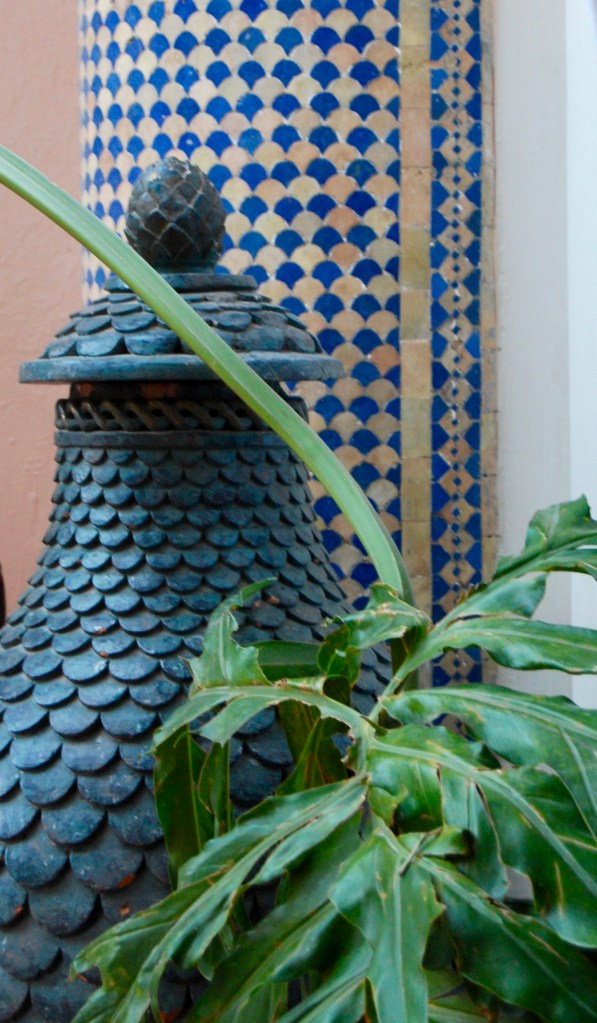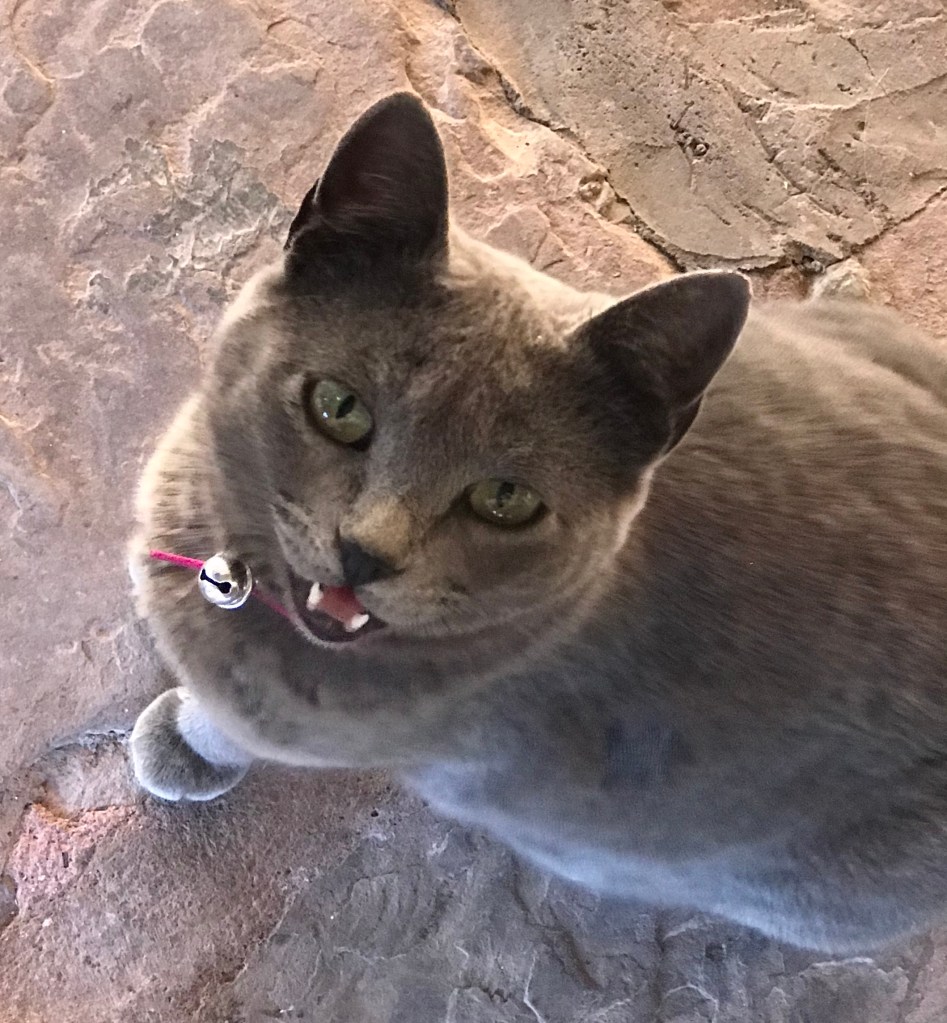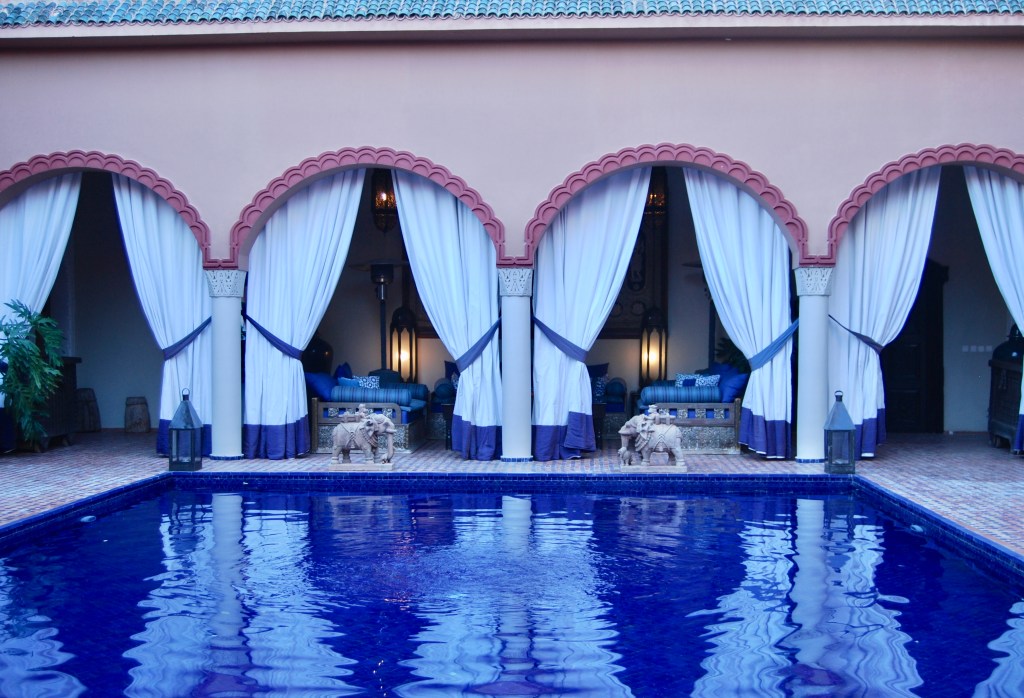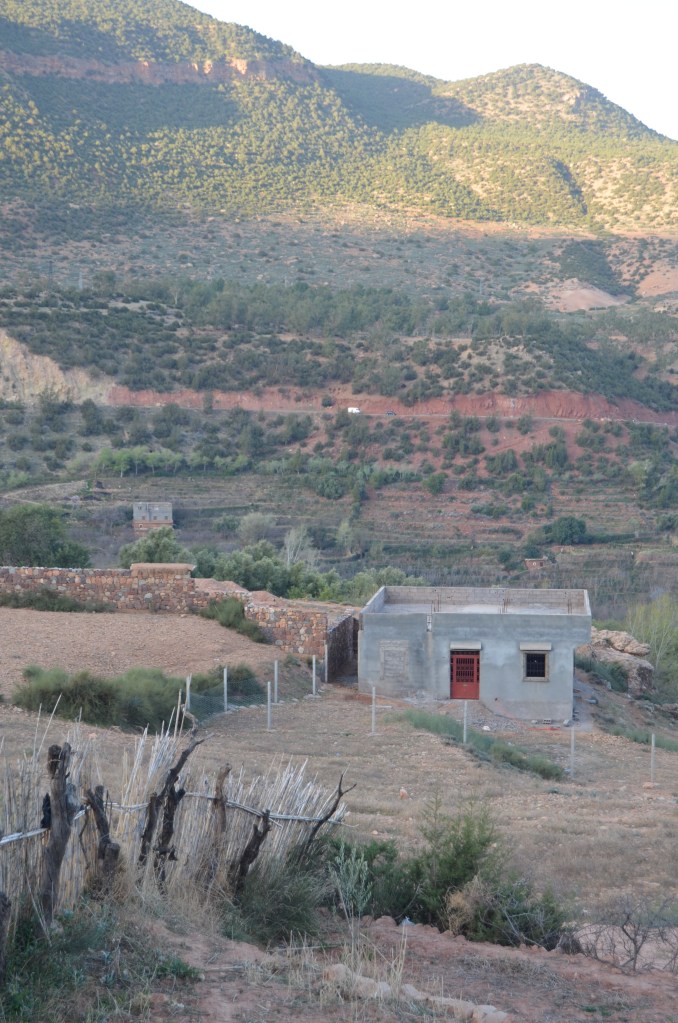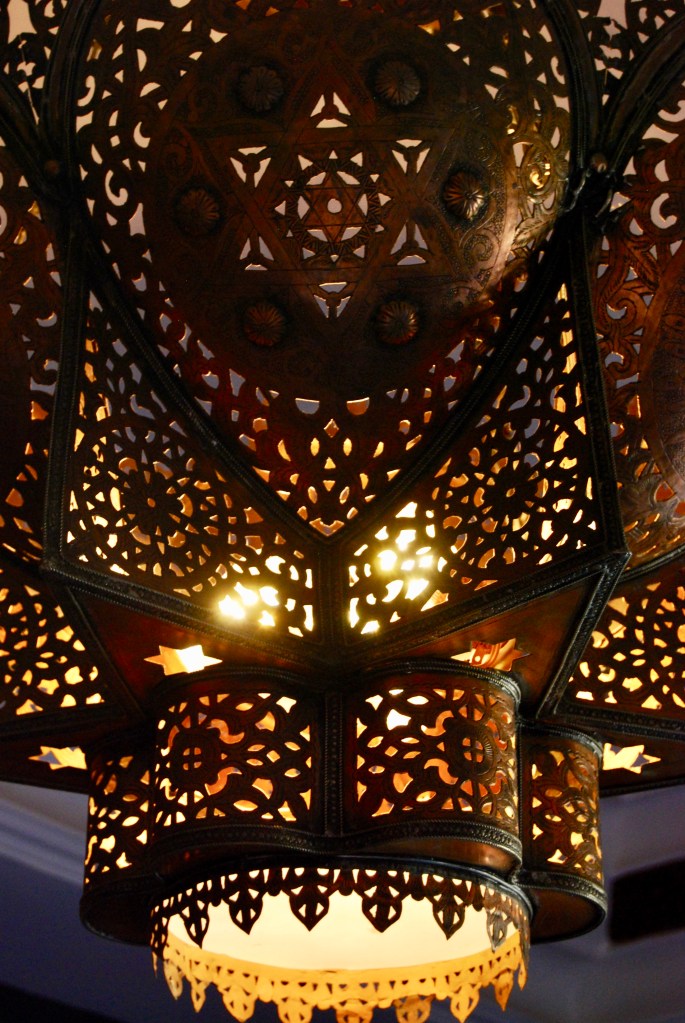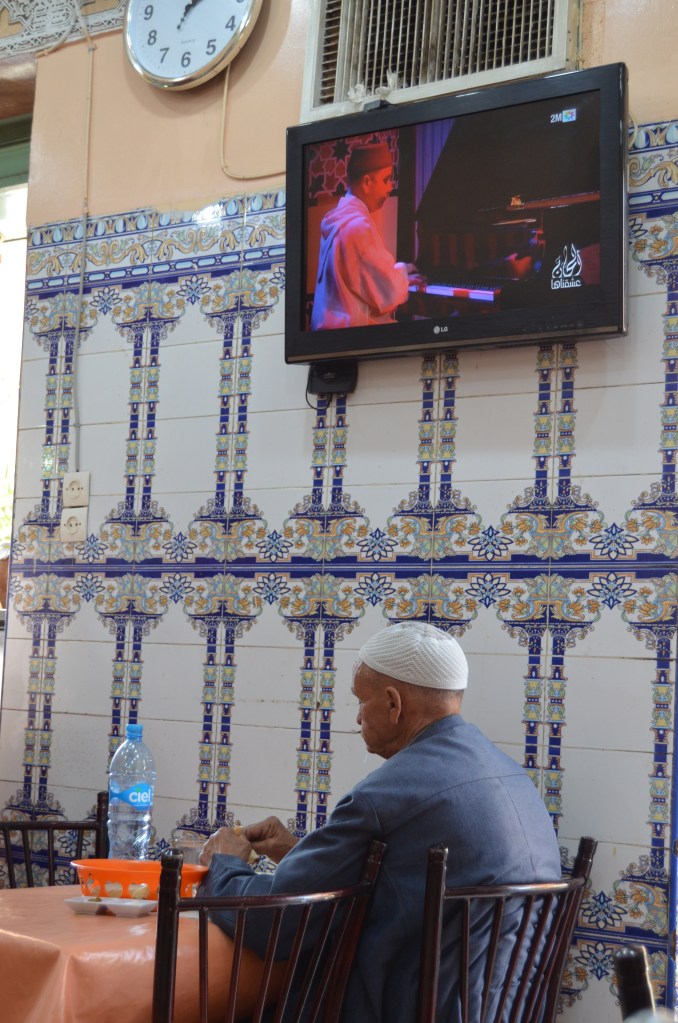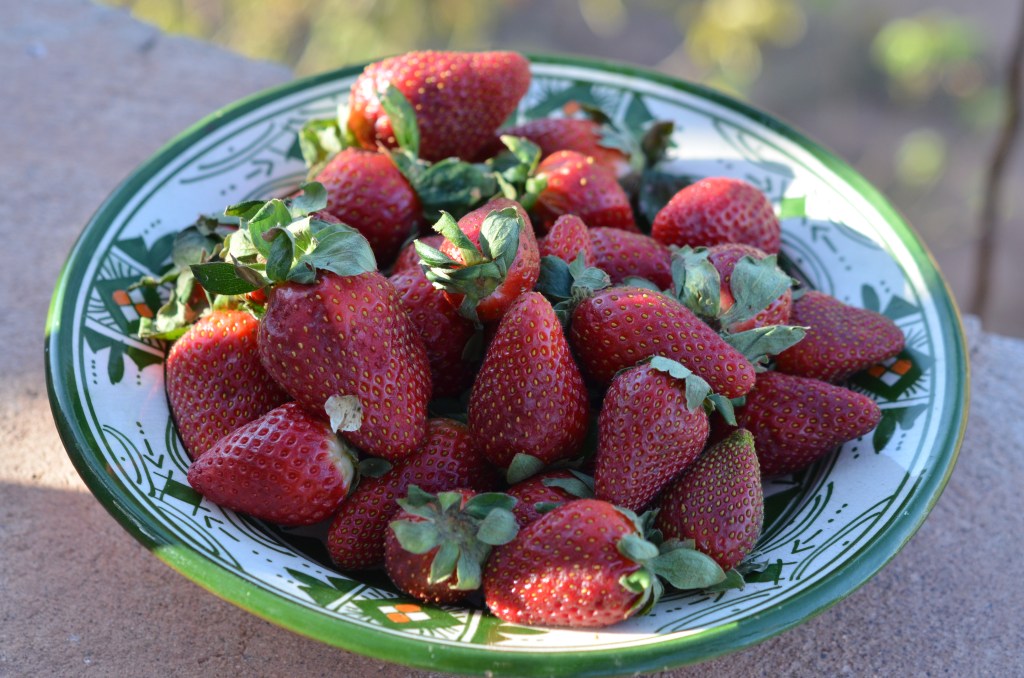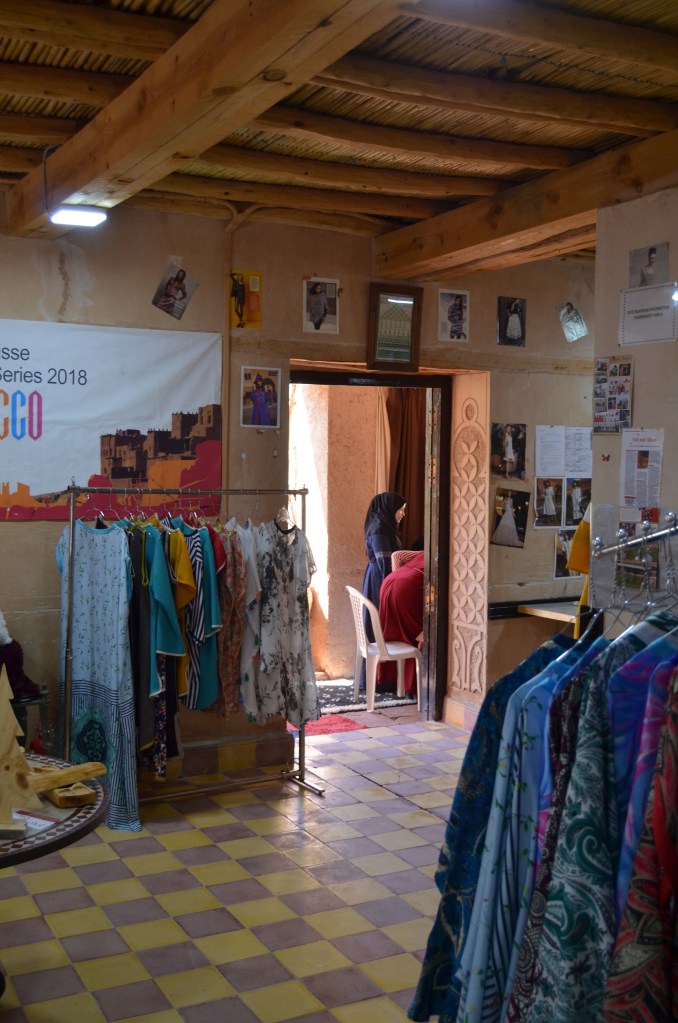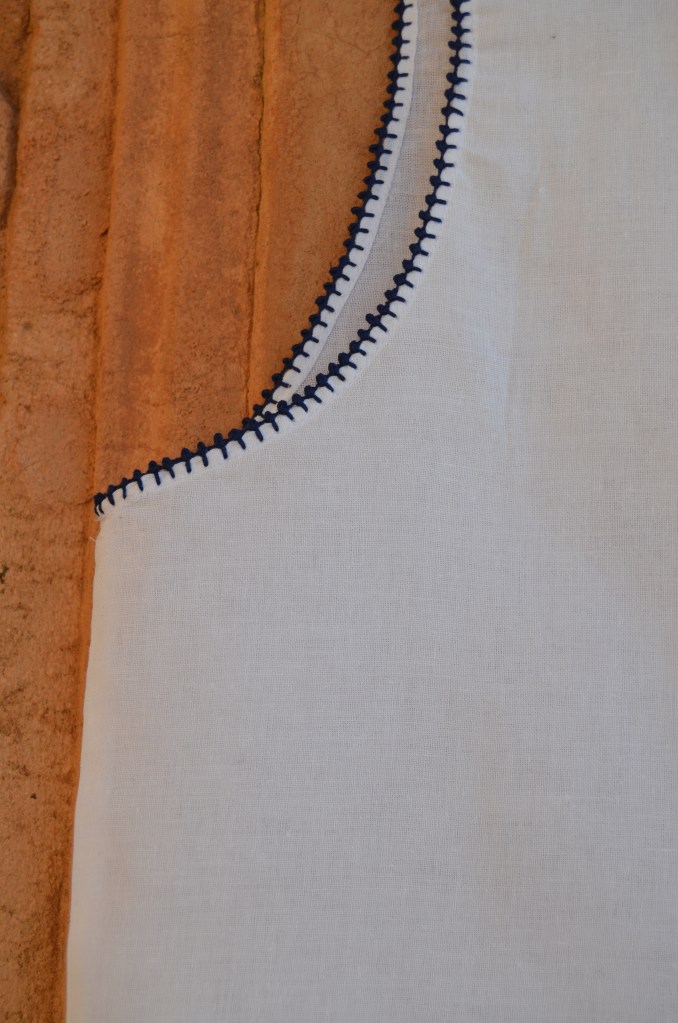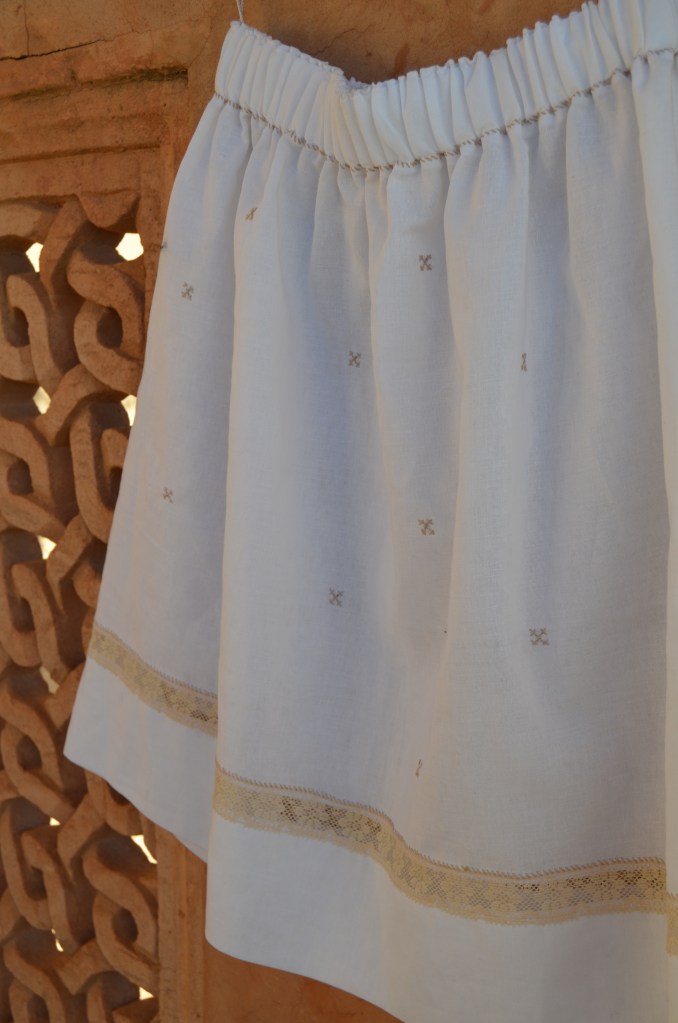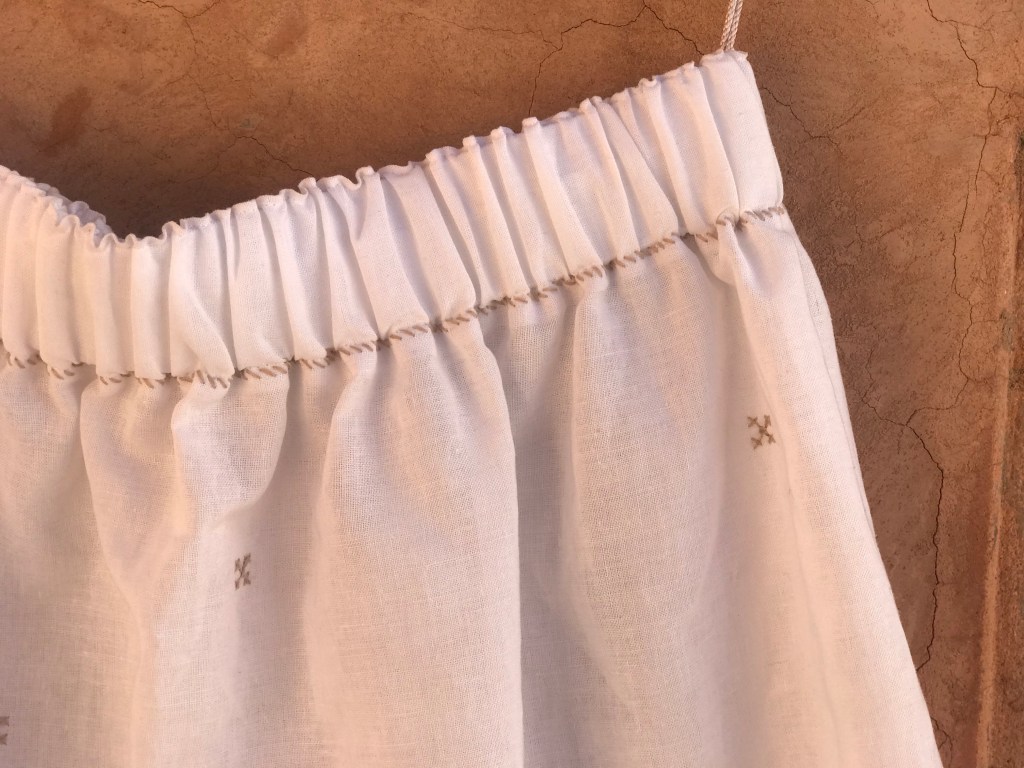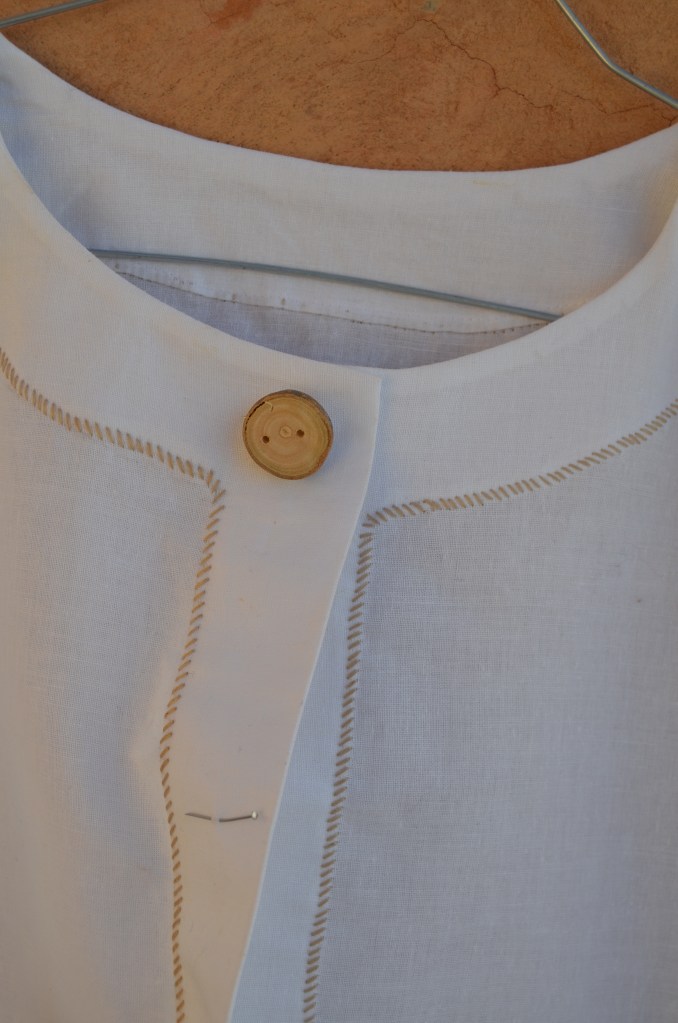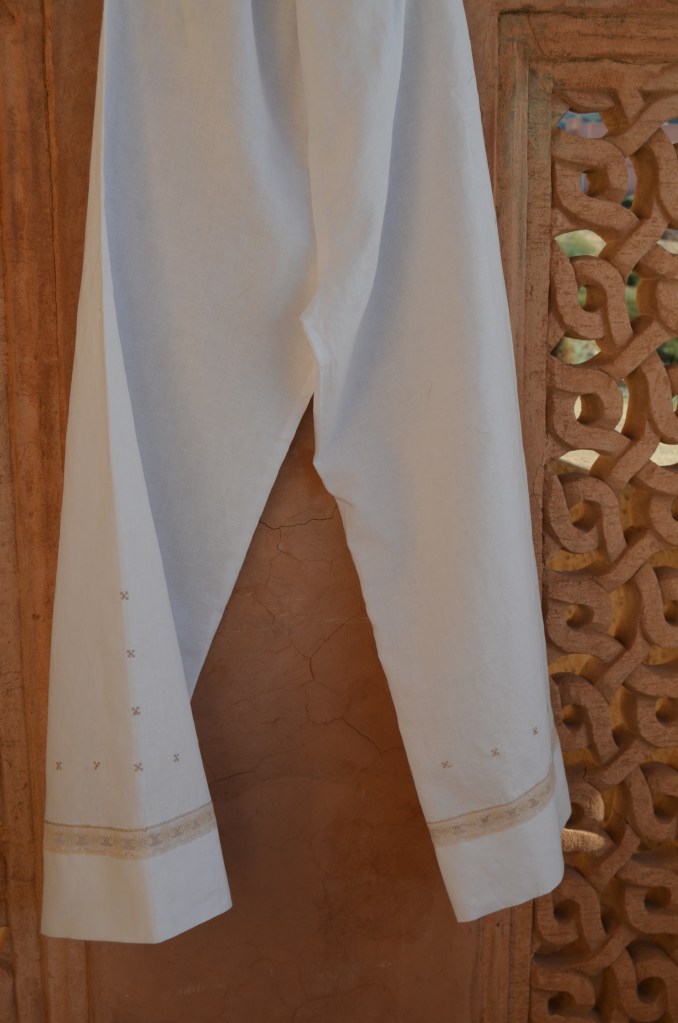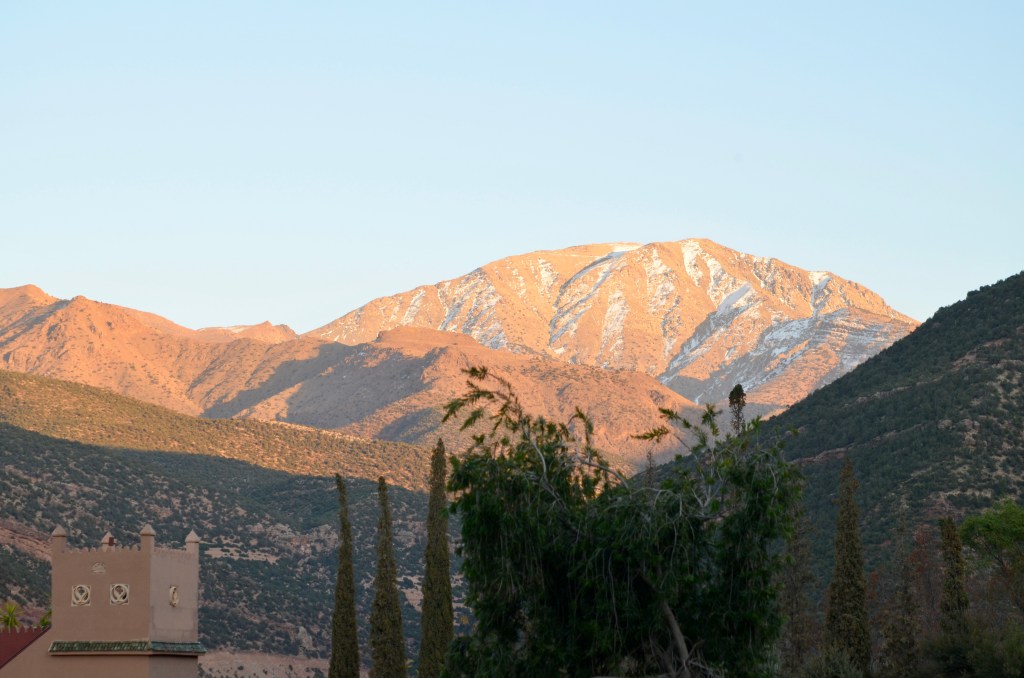
Wednesday, Feb 5th
It’s the end of my first day and my last night at Kasbah Tamadot in the Atlas Mountains of Morocco. I could get used to this combination of luxury hotel and working in the field, but tomorrow I move to the rooms above the sewing and embroidery studio in Tansghart, a small Berber village across the valley. I don’t really like fancy hotels when you have nothing to do but be intentionally bored. However, being a volunteer design director for the Eve Branson Foundation (EBF), makes staying here a pleasure. I am not a tourist like the group of loud Americans at dinner, who talked impeachment, and made me feel like I couldn’t get away from it even here. Instead I focus on the little mouse-grey cat, petite, with a pink collar and bell, who follows me around, crawling up the leg of my chair trying to get my attention, hungry, her belly extended from kittens that looked ready to pop out.
I went to visit the three craft houses today (weaving, woodwork and sewing) that are at the core of the EBF women’s empowerment program in this region. The weaving studio in Tamgannsin was first. We drove up a dusty winding road behind Asni, and stopped at a low red clay building that looked just like all the other dwellings. Three large looms sat in a whitewashed space. I loped in, a bit shy and awkward, and was met with indifference. I guess they just wanted to get on with their work and not be disturbed. Besides they get a lot of tourist visitors…

I find it hard to be here in the capacity of some sort of judge, and be critical while suggesting design changes as I see it. I mean, they do amazing work. It is skilled and rooted in classical history. So who am I to come in and say what should be different? And of course I have plenty to say. Like stay away from those from those rayon yarns in garish colors. Use natural, in yarn and color. Drop the orange, lime and pink. Use linen, wool and cotton. Be consistent. Don’t be afraid to make the same thing more than once. If it sells, make it again. There is nothing wrong with developing styles that can be repeated. And I do say so to Zoubair, the project manager. I’m not sure he hears me, he’s more concerned with everyday problems. Like the luggage tags he needs for some special guests at Tamadot, made from wood slices, with the names engraved, as well as the Kasbah’s logo. He’s stressed about them, shouting at Abdeltif, the head guy at the wood shop, that the names are upside down, as he turns over the tag to make his point. A long argument ensues between them, as they show each other, and Abdeltif proves that if you turn it his way the name is actually the right way up. They keep flipping the tag in different ways to win the argument, and after a while upside down becomes an abstract concept. A surreal moment in the desert, in the nothingness of it all — the elemental lives, the goats, the raggy sheep and skeletal cats, the half-built clay and mud homes, the red dust cloud every time a motorbike passes. I wonder if personalized wooden tags for the 1% really matter here, a place where survival and Allah seem foremost. I am more puzzled still, when Rachid, the head teacher of the sewing center is not at the studio to meet me. It causes Zoubair, who isn’t over the tags yet, even more frustration, as he frantically starts dialing numbers on his mobile. I enter the center alone, facing about a dozen young women in Hijabs, who sit together around a large table. Each one of them is hand-sewing or embroidering a canvas tote for the Kasbah, the freebie bag that hangs in the closet of every room. I smile at them and mumble Salam Alikom. They are shy and their shyness makes me shy. Zoubair does not bridge the awkward moment by introducing me and letting them know why I’m here. I hate that there is no common language to tell them so myself. Do they even know? Rachid was the one to work with, to translate for, me. As I wander around the studio, I wish that he shows up. In the back room, I find another a large table, and in my mind, I claim it as my space to cut and start making things. I check out the fabric room and leave uninspired. It is full of random fabrics in random colors, textures, and garish prints. I wouldn’t ever use any of them for anything. But this doesn’t bother me. It just reiterates why I was asked to come and help. I check out the impressive JAKI industrial machines, a Korean copy of YUKI, the Japanese Rolls Royce of sewing machines. I also spot one overlocker. The ironing board is leaning, half collapsed, against the wall in the kitchen. That has to change, I think to myself. I mean, while you’re pressing, the fabric needs to lie flat and drape freely on either side of the board. I smile at the girls, as I walk around the table, glancing at their work. They are using bleached white thread on the ivory colored bags and it looks cheap. Pity, I think, and then berate myself for being as critical as Zoubair was over the luggage tags. After finishing the call, he beckons me to follow him upstairs, where, as from tomorrow, I will be living. I ask him about Rachid and he answers that we will meet in the morning, as if that had always been the plan.
There are two spacious bedrooms with en-suite bathrooms. They share a large covered porch. The right one is yours, Zoubair tells me. The king-sized bed has leopard print nylon Chinese blankets for sheets. For warmth, he says, forewarning me of just how cold it gets at night. I frown and he shows me some Egyptian cotton sheets in the bottom of the closet (each one a damaged reject from the hotel). The terrace is inviting and looks over the wide and dry riverbed across the valley to the Kasbahs’s sprawling and oh so green campus. To my left are the snow-capped Atlas Mountains, distinct and majestic. Not so much snow this year, Zoubair explains, normally there is more water in the river by now. The drought is really bad for our agriculture… I wander into the second bedroom and notice a motorcycle helmet and a backpack on the shelf. Is someone else staying here? I ask. Zoubair’s answer is vague. Yes, there is a guy who stays here sometimes. I frown again. I am not sure how to interpret this. Do I want to share this small space at all? I’d imagined I’d be here alone. I like being alone and unselfconscious. Not having to make stilted conversation or worse, bear the silence of unshared languages. I ask why. He will be here to help you, Zoubair says. Like he can shop for you and cook. I like to cook, I say. Which is true. I like to putts around the kitchen, eat what I want. I am puzzled. And Zoubair says. He’s only here for you… if you want… And I make it clear that I’d rather be here on my own. That it will be awkward to share with a man whom I don’t know… and besides, I add, thinking I’m making a valid point in the context of the local culture, my husband may not like it either…

It wasn’t until later that it dawned on me that perhaps Zoubair wanted me to feel safe? And then my mind started spinning. Why? Is it not safe to be there on my own? Will I worry, now that I’ve declined a potential bodyguard? All thoughts that had never passed through my mind in the four months of planning this trip. Now, suddenly, the night before I move here, I worry in anticipation. I guess I’ll have a word with Hind, the project manager. I like her and expect she will be straight with me.
Thursday, Feb 6
This morning I asked if it was safe and Hind laughed. Yes, of course. I thought so, I answered, I just didn’t understand why you wanted someone to stay with me overnight…
Being here, on a London-made itinerary, is a lesson in going with the flow. From the moment I arrived, when there wasn’t anyone at the airport to pick me up, my arrival time lost in translation, to Rachid’s absence on the first day, the day that would my introduction to the studio, and getting used to Zoubair’s prickly disposition. Yesterday I wasn’t sure of it, but this afternoon reiterated the feeling that I was more of an inconvenience than a help to him. At 6.15pm, he let himself into the apartment, calling my name loudly, as if he needed me urgently. I came stumbling from the bathroom, surprised to find him fuming. Angry. At me. Clearly. But why? I’d been here barely two days. “You haven’t spent anytime teaching the girls,” he accused, “I was told, that this woman was coming to teach them, and now all you want is to go to Marrakech to buy fabric.” And why did I need fabric anyway? when there was lots of fabric downstairs and could I just sew something and show them already. Do my job! I stopped him by asking why he seemed so angry. He repeated himself, only louder. I tried to defend myself but I was so muddled, so confused at his perceptions and expectations, and so incapable of bringing it back to a level headed conversation, that eventually I turned around, went into my room and locked the door behind me. I was shaking. I was baffled. I had met Rachid at 11am that morning. He’d introduced me to the girls and I told them about myself while he translated. After the lunch break and unpacking, I found that Rachid would be in a meeting at Kasbah for the rest of the day. So, how had I misunderstood? How could I teach a room full of girls without a shared language? I had been prepping all day to be able to show, not tell, them. I got angry too. I was a volunteer! I didn’t answer to him! And I shouldn’t be intimidated…
It was another flow to go with. Another male ego running his “I’m the boss” test on me. I’d been here before, like a million times, throughout my career. But how boring to be in that awkward place already. Why can’t we just get along? Argh, I’ll have to take him aside first thing tomorrow, and draw a line in the desert sand. With grace, strength and conviction. Hopefully.

Friday Feb 7th
I didn’t. We let each other know we were still upset and as the day wore on we were polite. I’m sure this too shall pass. I had my first real day of hands-on work. After securing pattern paper, which ended up being pale pink wrapping paper from the market, I’d begun by making a few template patterns. A pant, a top, a camisole. I was surprised to find that they never used patterns at all, but rather each garment was drawn directly on fabric, and then cut and sewn. This meant there was no consistency in fit, and they could never repeat a style. It seemed amateur and the kind of corner I would cut when I was 15 and had a party to go to. I planned to start by getting them used to paper patterns. Using pink butcher’s paper. Then I needed linen and there wasn’t any. There wasn’t any fabric in a natural fiber and a neutral tone. Everything in the store room was either polyester, rayon, or viscose, and came in colors like burgundy, mustard, teal, cobalt blue –you get the picture. A nightmare for me (natural fiber and neutral color obsessive). But two days ago, I’d spotted a nice white linen at the weaving studio, where the napkins and table cloths were made. I would ask Amina, the strong, empowered woman who ran the weaving studio. I had to go begging, because the weavers were the a-listers, the pros, whereas the girls at my studio were treated as the inexperienced teenagers. Zoubair came to collect me and we drove to Tamgannsin. Along the way I told him how cold New York was (when in doubt talk weather), and he went onto convince me that Central Park was full of palm trees and the city was definitely not near the ocean or any other body of water. He knew this for a fact because his friend had lived there! No matter what evidence I produced, even frantically scanning my phone for definitive pictures, his mind was made up.

Amira did indeed have some lovely fabrics. But she wouldn’t share. Not the grey linen, not the handkerchief cotton, not the light wool either. In the end we settled on six yards of white linen and some cones of thread for tassels. As I walked from the car back to our studio, I was surrounded by a group of little schoolgirls, walking home from elementary school (most girls do not attend high school). It was Friday and they were in a silly jubilant mood. One of them spotted my white Birkenstocks with white socks (sorry, but yes) and squealed and pointed. Soon the whole group was giggling and screaming and pointing, as if I were wearing clown shoes. Part of me felt like I was ten again and being bullied by the cool girls, the other part laughed too. After all, Birkenstocks and socks are a longstanding joke. Then I took a good look at their footwear, expecting sneakers and plimsoles, but they were wearing furry house slippers in the shape of cute animals (think Hello Kitty), and all these little faces, from kittens to pink bunnies stared back at me from the red dirt road. I laughed and felt like pointing back at them — their desert shoes were way sillier than mine!

I don’t have internet here. In the flat. So at 6.30, when the sun has disappeared behind the mountains and the temperature starts dropping towards the 40-ties, I texted Zoubair. Politely telling that I needed to check my e-mails and talk to my husband. He sent the staff-van to pick me up. Turned out to be a good idea. I sat in the library, by a huge woodfire in a plush velvet chair with a large painting of some pasha looking down on me. I ordered a $20 Scotch (no, not the most expensive one). I spoke to Alastair and Leila and my mom. I downloaded three episodes of Anne of Green Gables. Yes! I find it comforting because it reminds me of Pennsylvania, like the farmhouse, and my old London friend Geraldine James plays Anne’s mother. Besides there isn’t much choice on Netflix when you’re in Morocco. I got a little tipsy and went back home in the same van. It was cold in my room. Even in bed, it’s cold, very cold. The windows and doors are thin and there are cracks around the frames. The best thing are the sounds coming across the desert. From baying donkeys, barking dogs and cats on heat to hooting owls and other night birds. But now I’m going deep under the sheets and blankets and watch a bit of Anne.
Saturday Feb 8th
Tonight, I managed to make the AC unit work by switching out the batteries from my flashlight. Not for long however. So I’ll write till my hands freeze. 42F tonight! I’m gonna borrow an electric blanket tomorrow.

I did go to Marrakach with Rachid today. It was amazing. Just to be in the medina/souk and see all the stuff and be there with him, which meant that no one bothered me and he haggled every price down for me, something I’m really bad at. I got Kiki a blanket for her bed after the one I got for Christmas got lost in the post. It’s beige with big pompoms. Leila gets a beautifully made wooden spoon, knife, fork and bowl and silver rings for her second piercings, and Iona gets Arab slippers, black with white embroidery. Alastair wanted a flute, a nay, so I got one, but he’s also getting a cool hat from the Kasbah’s shop. We picked up interlining, elastic, embroidery thread, 50 yards of white linen, pins and needles and bananas and strawberries. We had lunch at a traditional Moroccan restaurant only visited by locals, except for a Russian/Serbian looking guy, who, we both agreed looked like a lowly Mafia type. He seemed drunk or high or both, macho in an insecure way and he asked the restaurant to look after two big black bags for him, which he left behind the bar and promised to pick up later. We fantasized that in the movie version the bag would be full of money and the start of all sorts of spiraling trouble. Well, I fantasized this and entertained Rachid with storylines. He’s very chill and easy to be with. We went onto the El Fenn hotel’s boutique and I showed him some things that I felt we could learn from. Fabrics, colors, details. The “concept store” environment, and how everything was merchandised beautifully and simply.
Sunday Feb 9th
Today was a perfect day. I spent it alone in the studio. My plan was to go for a hike in the morning with my camera and take pix in the mountains but as soon as I took pictures around our building, the man across the street appeared in his doorway and stood, arms folded and stared at me. I said salam, but he made a loud point of ignoring me. There were so many design ideas in my head that I put the camera away and went inside. I want to make patterns and cut, if not make, lots of garments before I leave. I went into the studio, turned on the lights and put out the things we’d bought –the yarn, the fabric, the trims. Then I laid out my sketches and drew some more. I put up the new big and sturdy ironing board I’d bought for the studio, and spent an hour cleaning their “new” iron which was streaked with gunk, burned into the steel bottom by all the nylon and polyester they’ve been using. This has to change. It seems like they gravitate towards artificial fabrics, maybe for drape, or for the garish prints. I don’t know. Even in the market there were hardly any natural fibers. (Is the third world becoming a dumping ground for “plastic” man-made yarns?) It’s annoying. Places like this could grow their own flax and cotton, it would keep local agriculture going, and stop farmers from being forced to move into the cities that are overburdened and without sufficient work for young people. Grow local, and make local, then ship and sell to nearby regions. This whole valley lives on agriculture – 70%. The rest is tourism. There is quite a bit of eco-tourism. So why not put the two together?
Meanwhile I spent the day in the studio. Alone, sewing. Heaven. The door to the patio was open and half a dozen cats were scattered, asleep on old rugs, around the porch. Every few hours, prayers ring from the various villages around the valley. To the left and to the right. It feels like they riff off each other, harmonizing their prayers chanting, calling, stretching their sounds. Some times a donkey joins in with a bay that is eerily in tune. When they stop, the valley seems to be perfectly silent for a while, like silence has its own echo. Then the birds resume their twittering song and two cats duke it out over their territory once more. These standoffs go deep into the night, threatening, but almost never resulting in a screaming and tussling fight. The odd motorbike putters by, and even more unusual is the sound of a car. Of course there’s the sound of kids playing, especially on Sunday. During the week, the school down the road burst into screams and yelling every time there is a break. This is same sound the world over. The universal noise of play. It falls silent as soon as the bell rings.
I made myself crepes for breakfast. Tiny ones because I only have a tiny frying pan. Two I filled with the strawberries and bananas that Rachid had bought me the day before. Another with the packet of Nutella that I’d taken from the breakfast counter at my Gatwick airport hotel, just in case I’d end up with a chocolate craving in the desert. And one I filled with the local yoghurt that is more like cream.
The nights are so cold, sometimes overwhelmingly so. As soon as the sun is gone the temperature plummets from the sixties to the forties, which really calls for some additional heat. I’ve been battling the AC unit in the wall all week because the remote promises that if “You Feel cold” (this is one of its settings!), there will be heat and visa versa if “You Feel Warm”. On Saturday night it finally surprised me with a blast of warm air that lasted about ten minutes, before the motor puttered out. After that, it only blew cold, which was worse than nothing. Now we have come to an agreement that if I do not fuck around with the controls too much, it gives me ten minutes every night, and sometimes it may even work in the morning. I make my bed like a nest. Layers of blankets and feather comforters between me and the mattress, plus the super soft blankie I brought with me. I never got the electric blanket I asked for, but I’m warm enough, wrapped like this. The pillows are stacked around my head and I pull it all up around my face so I can breathe but little else is exposed. Of course I am fully dressed in pajamas and a thermal vest. I pull off my socks after a while. There is something depressing and claustrophobic about wearing socks to bed. I sleep quite well for about 5 hours, and have exciting dreams about dating celebrity men, but, when I awake, I can’t recall their names. Showering is torture. I keep wishing that the tiny stream of piping hot water, will give me some satisfaction, but it doesn’t. Once in it I don’t want to get out, the cold too jarring. Washing hair is worse. I try to do it in my lunch break when the air is warm enough to dry it. But the air is never really warm. The sun is warm. The air is cold. And the houses are built to keep the cold air trapped inside. I’m sure this is effective in the summer, when it gets up to the 90-ties during the day. I look like a Berber, the way the modern Berber dress, in layers dictated by the temperatures. I start with a tank, then a long sleeved tee, then a sweater, then a long cardigan and then a quilted vest. All this over pants and socks and sneakers. My neck is wrapped in a long woolen scarf. My hair is in a ponytail, (between the dry air and the nylon in some of my clothes it sticks up straight like I’ve just held my finger in the socket).
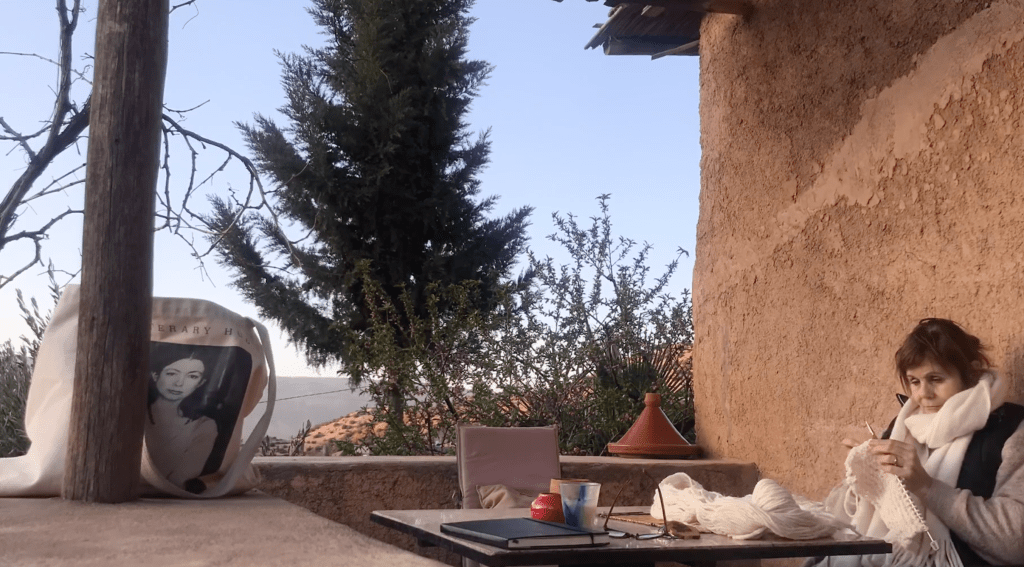
Wednesday Feb 12th
The last few days were too frantic to get one word into my journal. I stayed late in the studio, making myself a quick dinner, and headed back down until it got too cold to work. I really wanted us to have enough to show for my visit to make a difference once I’m gone. Paper patterns, fabric examples, and a small collection of different, easy to make and hopefully sell, styles. This afternoon was the most fun we’ve had together. The true bonding always happens on the last day. It’s the same with my plastic pollution workshops. The time when all the work we have done together goes on display, and we show and tell. Then we did the group photos, followed by several dozen selfies and a lot of laughter. I went around the circle and made them all say “I am awesome”, for some of them these were the first English words they ever spoke. Then I went upstairs and photographed the clothes we made. Just so you know, it started with me making the patterns from the pink paper. A couple of the girls went to learn some basic pattern skills, taught to them by Rachid, from my basic patterns. Then I cut the first few designs – a camisole, a skirt, a shirt, pants and a jacket. Two tops, that came later, were cut and sewn by Tualia, who is clever and motivated and speaks a bit of English. I taught them how to pleat and used this on two of the tops. I wanted to somehow incorporate the work from all three studios, and so the jacket is made from fabric woven in Amina’s weaving studio and the wooden buttons are made in Abeltif’s workshop. All the embroidery was done by the girls, and they finished everything in time! (All the styles we made are shown at the end of this blog.)

A week isn’t really long enough but we accomplished a lot. I leave tomorrow morning…
Thursday Feb 13th
I’m on the plane back, trying to figure out how I feel. I’m not disappointed. I’m happy with what I accomplished. Happy for myself and the girls. Despite being put off by Zoubair’s attitude towards me. I left my quarters tidy, of course, and this morning I found him there, like the headmaster at boarding school, inspecting the rooms. I stood watching him. Startled at his lack of boundaries. He was already irritated, like he had something better to do, but did he expect (hope?) to find something amiss? Like an un-emptied wastebasket or dried toothpaste in the sink? Or a rug stuffed into my suitcase? Despite the fact that there had been no running water since the night before, I passed. I gave him a sarcastic thumbs up, and he, patronizingly, answered, “yes everything is ok.” I’m not sure why his moods were so significant that they made me feel inadequate. His overwhelming macho irritability, the feeling that nothing is right or good enough, that everything is other than his expectation. Maybe it’s not him. Maybe it’s the culture. Maybe it is what we, Westerners, project. Maybe it’s the mystery that wants to stay a mystery. After all, we do not have the answers. We fucked it up so bad with all our development, our greed and need for more and more. The only things they have more of are children. Ten per family. About. And by our standards, very poor. But the girls at the craft center seem to be having the time of their lives. And yes, that is made possible by the EBF foundation. It’s a place to go during the day, instead of school, which they cannot attend, and be creative, and sell a little bit. But what is the promise? What is the expectation? They still want to get married, have their own ten children. They will never work. And what if they did? Say they became seamstresses, uneducated otherwise, what would this kind of independence, and most likely being single, really get them? These will be their best years. They are carefree and they laugh a lot. They are as entertained by me, as they might be by any other distraction. But they can’t afford ambition. Not our kind. It’s day by day. It’s happiness in the now, sitting around a table chatting, joking and laughing, and whether they embroider Hello Kitty napkins or my white linen shirts, does it really matter? Maybe it matters if they sell more of my shirts. But where does that money go? Most likely into their father’s hand, to help pay for the survival of their large family. My days in the studio with the girls were fun. I know that, with my questioning, critical mind and my need to prove myself, I can get in my own way and make it harder. And that’s on me. I kept wondering: what do I really contribute? What would leave a lasting impression that does indeed help, makes things just a little better than before? The compliments from the visitors are nice, the compliments from EBF London as I write my daily reports (and omit grumpy Zoubair and elusive Hind) are nice. But it’s not for that. It’s not for my ego gratification. That would be really fucked up. Am I just some kind of do-gooder missionary? Like in the Anne of Green Gables episode where the nuns steal Indian children from their villages to convert them? And am I looking for ways to create a product that makes a wealthy western buyer also feel good about themselves as they bring home a set of locally embroidered napkins, as redemption for their insanely indulgent vacation? Is “the good” really being done? Maybe, if that mother who passes every morning, the one with the baby boy who has the Croup cough, can get the right medicine for her kids? Maybe if those girls got an education beyond 12 years old? Learn English, so I can ask them what they really need? What opportunities would be good for them? They seem so happy, right there in the moment. Being social. Being creative in their own way. I just don’t know. The place was overwhelming in its differences. Maybe, over time, it will all take shape for me. But for now, I have come away with more questions than answers.

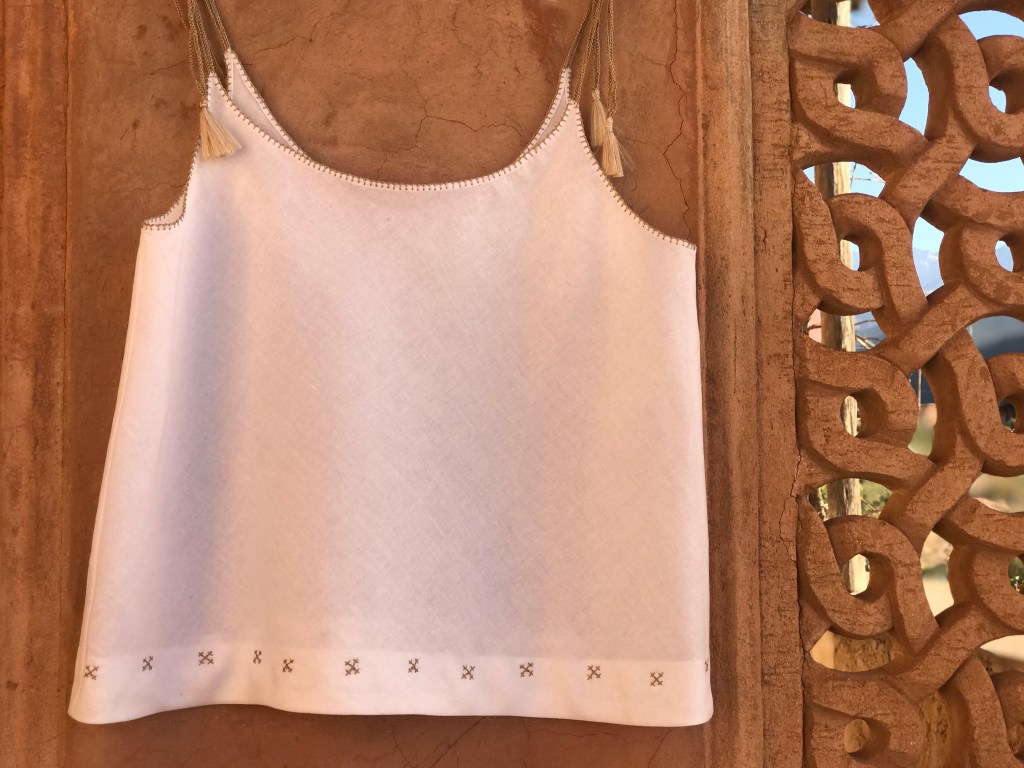

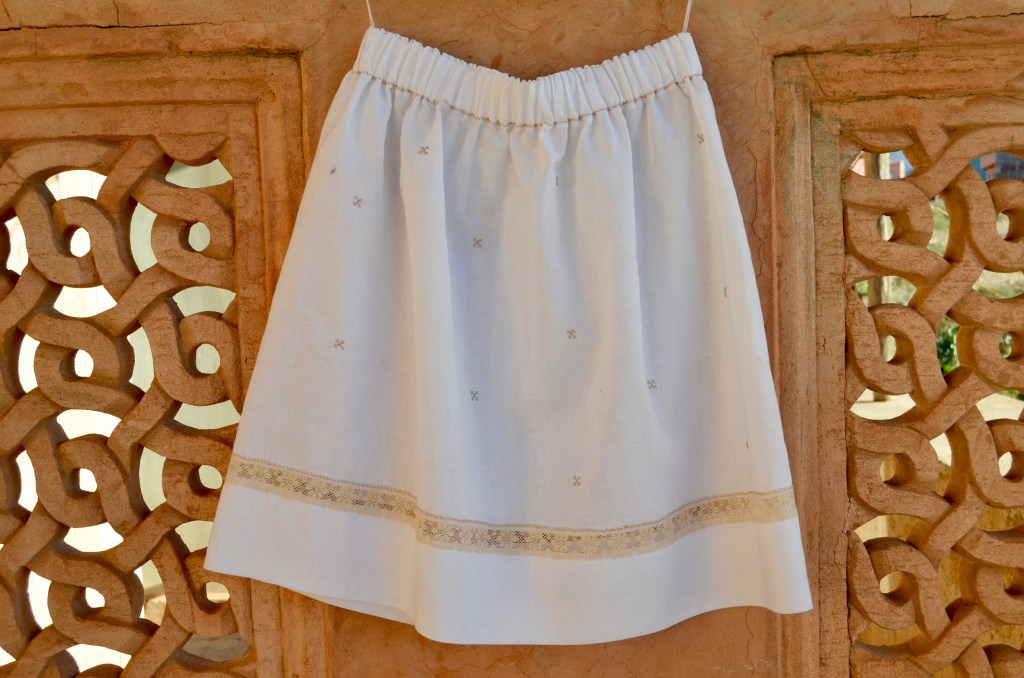



The Eve Branson Foundation is a small charity based in Morocco, spearheaded by Richard Branson’s mum, Eve Branson (95). Their mission is to provide young people with valuable skills-training through our dedicated craft centers and to preserve traditional Berber crafts, enriching the lives of local families from Atlas Mountain communities. link to website.


